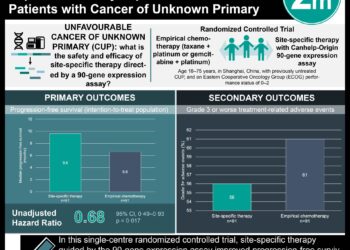Sequencing finds rare genetic disease risk in 1 out of 5 healthy adults
1. Whole genome sequencing (WGS) in primary care reveals new genetic diseases.
2. Currently, the clinical utility of such findings and clinical actions to be taken is unclear in the primary setting.
Evidence Rating Level: 1 (Excellent)
Study Rundown: WGS, including exome and genome sequencing, is increasingly being used in healthcare for the diagnosis of highly heritable conditions and undiagnosed diseases, as well as in prenatal screening and in cancer treatment. The authors of this study aimed to describe the effect on clinical care and outcomes of adding WGS to standardized family history assessment in the primary care setting. In general, it was observed that WGS revealed rare genetic disease risk in 1 out of 5 health adults. However, the clinical utility of such findings is currently unclear. This study has several limitations. Mainly, the small sample size limited the statistical power to detect between-group differences. Additionally, future studies require greater ancestral, geographic, and socioeconomic diversity than this current trial. Overall, the results of this study indicate that WGS may play a key role in the primary care setting in the future.
Click to read the study in the Annals of Internal Medicine
Relevant Reading: Evaluation and Management of Patients After Implantable Cardioverter-Defibrillator Shock
In-Depth [randomized controlled trial]: The authors of this study conducted a pilot, randomized controlled trial including 9 primary care physicians and 100 health patients between the ages of 40 to 65 years old. Patients were assigned to one of two groups: family history report alone or family history report plus a WGS report. The WGS report included monogenic disease risk, carrier variants, pharmacogenomics associations, and polygenic risk estimates for cardiometabolic traits. Generally, 11 family history and WGS patients (22% [95%CI 12% to 36%]) had new monogenetic disease risk results. In relation to these findings, primary care physicians recommended new clinical actions for 16% (CI 8% to 20%) of family history patients and 24% (CI 22% to 49%) of family history and WGS patients. Of the primary care physician management of the monogenetic risk results, geneticists rated 8 results as managed appropriately (73% [CI, 39% to 99%]) and 2 results as managed inappropriately (18%, [CI 3% to 52%]).
Image: PD
©2017 2 Minute Medicine, Inc. All rights reserved. No works may be reproduced without expressed written consent from 2 Minute Medicine, Inc. Inquire about licensing here. No article should be construed as medical advice and is not intended as such by the authors or by 2 Minute Medicine, Inc.


![Maternal cell-free DNA sequencing superior to standard aneuploidy screening [CARE Study]](https://www.2minutemedicine.com/wp-content/uploads/2014/02/47-karyotype-350x250.jpg)




